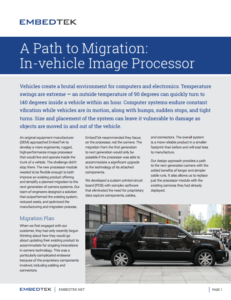In-vehicle embedded electronics have an unreasonably tough job. They must still deliver high performance data capturing and processing power while withstanding constant harsh conditions such as extreme temperatures, shock, and vibration. When designing and installing in-vehicle electronics, the balance between reliability and performance can be tricky.
An OEM partnered with Embedtek to design an image processor that collects and analyzes data from multiple video inputs while operating reliably in the trunk of an active work vehicle. In addition, the OEM required a flexible solution that would bridge between its existing product offering and a new generation of camera systems.
The existing camera system had proprietary components, including cabling and connectors, which further complicated the design process. To eliminate this restriction, our team of engineers focused on improving the processor instead of the camera, because migration from the first generation to next generation would only be possible if the processor could allow significant upgrades to the technology.
Embedtek developed a custom printed circuit board (PCB) with complex software that would accept the input of currently installed cameras while also supporting the next generation cameras utilizing a different interface. This provides compatibility with the existing design and enables support for existing vehicles in the field.
The new design is more reliable, compact, and has eliminated the need for proprietary data capture components, cables, and connectors. The higher performance image processing and analytics increases the revenue as it is now able to capture more accurate information at higher vehicle speeds. When the next generation camera is available, a simple change in the manufacturing process will enable the future architecture without changing the nature of the video stream.
Our team of engineers designed a solution that outperformed the existing system, reduced costs, and optimized the manufacturing and camera migration processes.
For full article:



